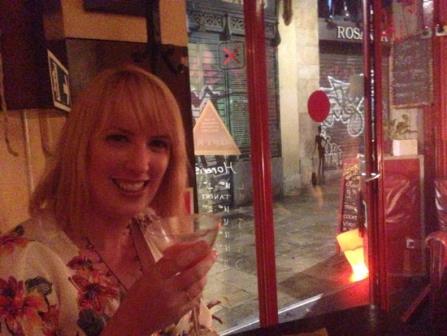From Scotland to Spain: Guiri Girl in Barca
 Julie Sheridan is a Scottish copywriter, poet and blogger who quit her home and career in Edinburgh in spring 2011 to follow a lifelong dream of achieving fluency in Spanish. She’s been ensconced in the Catalan capital ever since, getting eaten alive by mosquitos who feast on rare Celtic blood. She is also a Trustee of Latin American street children’s charity Casa Alianza UK.
Julie Sheridan is a Scottish copywriter, poet and blogger who quit her home and career in Edinburgh in spring 2011 to follow a lifelong dream of achieving fluency in Spanish. She’s been ensconced in the Catalan capital ever since, getting eaten alive by mosquitos who feast on rare Celtic blood. She is also a Trustee of Latin American street children’s charity Casa Alianza UK.
1. Why did you move abroad?
With one sole goal – to become fluent in Spanish. I had studied it at university and had been in love with the language since I first heard Gloria Estefan singing in her native Spanish in the late 1980s. After graduating and starting a professional career in Edinburgh, I had very little opportunity to practise my Spanish, and in my early 30s I decided there was nothing for it but to quit my life in Scotland and head south.
2. How do you make a living?
I work full-time for a large international company, which has its European headquarters in Barcelona. This is the second company I’ve worked for here – before I moved from Scotland, I came to Barcelona for a day to have an interview and tests for a job offer I’d seen advertised on InfoJobs. Although I had savings behind me, I wanted to make sure I had a solid job lined up before getting on the plane, especially given the economic situation that Spain’s been suffering over the last few years.
As I was waiting outside the office for the interview (in a good district of Barcelona), a middle-aged Catalan man approached me, shouted at me and tried to snatch my handbag, passport and all. I took it as a test of my resolve to move to Spain.
I stayed with the first company just over two and a half years, as a copywriter and online content manager. The experience was perfect, because I was managing staff who spoke no English at all. It was exactly what I needed – to be immersed into working life in Spain, with all emails, meetings and conversations in Spanish. I was very lucky as well that the company had Spanish as its official language, as many firms in Barcelona operate exclusively in Catalan.
In my current job, I’m a Communications Specialist, writing, editing and managing online content for a variety of audiences. Since the firm is American, the lingua franca is English. This makes sense as there are some 400 of us from over 35 different countries, and of course it gives me a huge advantage as a native English speaker and writer. It does make it much more difficult to keep on advancing in Spanish, though, and I’ve noticed that I have to make more of a committed effort to study outside of work so’s not to lose momentum.
3. How often do you communicate with home and how?
It’s mostly through emails, as my family don’t use WhatsApp and text messages cost a fortune. I tend to Skype my parents on Sunday nights, and keep in touch with close friends over Facebook. For friends who’re not on Facebook, every now and again we write long emails to update each other on what’s going on. Barcelona’s one popular destination, and friends and family often come out for a visit too, which is great.
4. What's your favorite thing about being an expat in Barcelona?
I love Barcelona’s energy, dynamism, and sense of breaking the mould. When you move here, it’s as if the city automatically hands you a creative licence and it’s up to you how you re-invent yourself. There’s a huge international community in Barcelona and being able to flit between both that and the local community is a privileged position I don’t take for granted.
5. What’s the worst thing about being an expat in Barcelona?
Depressingly, in western Europe in the 21st century, having to deal with the sexist behaviour of men on the streets. I’ve been here three years now and am still infuriated by it on a daily basis – the catcalls, the comments, the hisses and gestures. The reaction of Spanish friends when I bring this up is also disheartening. Many deny it even happens while females are conditioned to think male attention on the streets is a cause for celebration (“¡Qué éxito!”) rather than a form of sexual harassment. After having to endure the umpteenth vulgar comment of the day, however, that’s not how I see it.
I’ve been robbed three times in 14 months and had two iPhones forcibly taken off me in the space of nine months, so having to constantly monitor my possessions even in the most innocuous of surroundings is also a major turn-off.
6. What do you miss most?
Clarity and transparency when it comes to financial rules and regulations. Everyone always complains about the tax system of their own country, but over recent months I’ve been realising just how good we have it in the UK.
Trying to get a straight, definitive answer out of civil servants here is not an easy task, and there are a lot of inherent contradictions within the system. If you have a typically British way of thinking about these things the Spanish reality can be very frustrating. For example, in the UK, income tax is a fixed percentage of your salary and is deducted automatically, but here, employers deduct whatever you tell them to, meaning that you’re left with an unholy mess at the end of the tax year. The rules on gift and inheritance taxes are punitive, unlike in the UK, and if you’re self-employed in Spain you’re obliged to pay money each month even if you’ve earned nothing at all.
Trying to get to the bottom of all this, and comply with the legal requirements, is an absolute minefield, and I really miss how relatively straightforward – and I have to say, how much fairer – it is in the UK.
7. What did you do to meet people and integrate in your new home?
When I arrived in Barcelona I didn’t know a single person, so I immediately signed up online for language swap sessions as a way of meeting people. I remember that my first couple of months here were an incessant round of meeting strangers in cafés, trying to make connections and get a feel for the local mindset. Some of the people I met back then are still good friends over three years later, and I’ve also been really lucky to meet people in Barcelona through my blog. In fact, two of my best friends here initially contacted me over the blog to introduce themselves.
I think it helps a lot if you try to keep an open mind, especially over the first year in your new country, because the cultural stimuli you’re surrounded by are coming thick and fast and it’s hard to process it all.
8. What custom/ habits do you find most strange about your adopted culture?
The eating hours are something that I think I’ll never get used to, no matter how long I live in Spain. I’m up at 7am to walk the dog and get ready for work, so by 1pm I need to eat. My Spanish friends tend to head for food around 2.30pm or even later, and dinner time for them is typically around half nine or 10 at night. I can’t face a large meal at that time, especially if you go out for dinner and they bring the cheese board round at 1am! My Spanish and Catalan friends all laugh at my ‘Anglo-Saxon’ eating hours, but I think they’re healthier, or at least, it’s what feels more comfortable to me.
9. What is a myth about your adopted country?
Well, a lot of tourists pitch up in Barcelona expecting sangria and siestas, the stereotypical Spain of bulls and flamenco, but that’s not Barcelona at all. Catalonia has a very clear idea of its own unique cultural traditions and how to celebrate them, whether it’s eschewing tapas for home-cooked Catalan cuisine or banning bullfighting and applauding people-pyramids instead.
A more general myth is the infamous “mañana, mañana” laidback lifestyle, but that’s not how Barcelona operates either. I work longer hours (for a lot less money) here than I ever did back in Edinburgh, and people are pretty short on patience, whether it’s drivers trying to mow down pedestrians or the cashier in the local supermarket chucking your groceries at you at lightning speed. This is a big, busy city and putting things off to ‘mañana’ just isn’t their style.
10. Is the cost of living higher or lower than the last country you lived in and how has that made a difference in your life?
That’s a really interesting question, and to be honest, one that I’ve been putting off looking at for quite some time! At first glance, the answer would seem to be that Spain is cheaper than the UK. If you take staples like fruit and veg, there’s no doubt – fresh produce is heavily subsidised in Spain and for a juicy red pepper, for example, you’ll pay less than half what you pay in the UK. Alcohol in supermarkets is also ridiculously cheap here.
But dig a little deeper and it gets a lot more complicated. Rents in Barcelona are sky high. Salaries, meanwhile, are rock-bottom, and most Spanish firms don’t offer their staff a company pension scheme. In my experience, Spanish people have a habit of living day-to-day, and don’t like to talk about their plans for retirement, when it’s the right time to buy a house, or even if it’s time to start saving.
Then there’s the tax system, which I mentioned earlier. Spain has many taxes that can hammer your finances. If you own property, whether here or abroad, you’re taxed on it – even if you have no income from the property itself.
It’s a topic I’m planning to cover properly soon on my blog, but I suspect that living in Spain is financially not doing me any favours. Of course there are many non-financial compensations, and I guess it’s up to each individual to weight that up over the long term.
11. What advice would you give other expats?
Don’t think of yourself as an expat, for a start!
The hardest time for me here was the first year, as I ricocheted from the giddy novelty of my new life to a grudging resentment of all the aspects that were really bothering me. I remember thinking that you have to try really hard to take a step back and remember the bigger picture of why you’re in your new country.
Be kind on yourself, too. There will be days you feel like throwing in the towel, but recognise that you need a break, and give yourself some time out.
I think you need a certain tenacity to live abroad, or maybe just a stubbornly defiant streak. I was robbed three times, made redundant the week before Christmas and almost raped on my own balcony all within the space of 14 months, and after each incident friends back home would say, “Move home!” The inevitable challenges that come up will vary depending on your own circumstances, but when they do, having a supportive network of local friends is worth its weight in gold.
12. When and why did you start your blog? 
I started it about a month after arriving in Barcelona, really as a way of letting friends and family back home know that I was still alive and hadn’t disappeared off the face of the earth. I also liked the idea of chronicling my time here. When I look back on early posts or even posts from last year, I’m always struck by my own impressions, and realise that I couldn’t write those same posts now. And I’m glad that I have a record of it all, even if I do feel guilty for not blogging more often. No-one tells you how bad blog guilt is going to be!
 Julie's
Blog, Guiri Girl in Barca
Julie's
Blog, Guiri Girl in Barca

To find out more about living in Spain
To be considered for an interview (as well as other articles), add your blog to BlogExpat!
Part of the EasyExpat.com adventure since 2008. Drink, Travel, Write